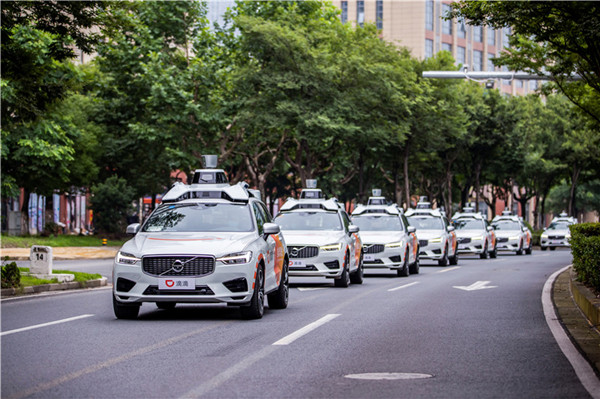 |
|
Didi Chuxing launches a self-driving ride-hailing service in Jiading district, Shanghai in June, a milestone in the application of intelligent connected vehicles. [Photo/jiading.gov.cn] |
Shanghai's Jiading district unveiled a three-year action plan to promote new types of infrastructure in the district, specifically in the areas of industrial production, medical services, smart transportation, financial reforms and urban management.
The plan said that Jiading will allocate 71.95 billion yuan ($10.2 billion) to 53 major projects related to 5G, scientific infrastructure, big data, artificial intelligence, intelligent connected vehicles (ICVs) and hydrogen fuel cell vehicles.
It also said that a total of 3,000 5G base stations will be built by 2021, and all roads in the district will be involved in the testing of autonomous driving services, and Jiading, home to the Shanghai International Automobile City, is expected to see a boom in its auto industry thanks to the favorable policies.
Local authorities said that the Shanghai International Automobile City has pledged to push forward the construction of new infrastructure, including next-generation information networks and 5G applications, ensuring full 5G coverage for autonomous driving tests in the area.
The Jiading district government, along with SAIC Motor, Huawei, China Mobile, and other industrial leaders, jointly launched the world's first 5G-based smart transportation demonstration project, known as 5GAA (5G Automotive Association), in 2019, which will speed up the application and promotion of 5G internet of vehicles.
The national Intelligent Connected Vehicle (Shanghai) Pilot Zone was built in Jiading in 2016, and the Shanghai Manufacturing Innovation Center was established in the district in 2017, helping Jiading create a complete industrial chain of advanced manufacturing.
Supported by the national Intelligent Connected Vehicle (Shanghai) Pilot Zone, the auto city is now home to a large number of industrial leading companies and key projects. Chinese tech giant Didi Chuxing launched its self-driving ride-hailing services in Jiading in June, as it is stepping up efforts to commercialize the technology.
The district has opened 53.6 kilometers for road testing of ICVs, covering an area of 65 square kilometers with full 5G signal coverage. The test road is also equipped with an advanced smart transportation system, including a high-definition map, a vehicle-to-everything system, and a holographic road sensing system.
Additionally, Jiading is focusing on green energy and has been exploring hydrogen energy applications in recent years. As early as 2007, the district launched Shanghai's first hydrogen filling station in Anting town. The Jiading Hydrogen Park was established last year, in an effort to support breakthroughs in the research and development of hydrogen fuel cell vehicle technology and its application and industrialization.

